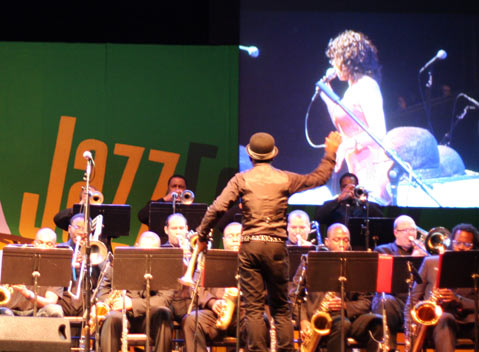Monterey Jazz Fest Report
Underground Man Chris Potter Outshines the Big Names at Monterey

GROUNDS FOR JAZZ ELATION: For lifer jazz fans in the 805 (you know who you are), the arrival of autumn brings an added glow of consolation and relief. After taking our business outside, traveling to hear jazz elsewhere, or cranking up the iPod or home listening apparatus, jazz springs back to life come fall. Santa Barbara’s traditional summer jazz drought subsides and the prospect of hearing America’s greatest music in the manner intended—live and in the moment, that is—is at hand.
Sure enough, the regional jazz pulse has already quickened. In the past week, we’ve heard the Charles Lloyd New Quartet kicking off the “Jazz at the Lobero” series, and the Chris Walden Big Band, with special guest Tierney Sutton in tow, paid a return visit to SOhO. SOhO is, by now, one of the regular venues for Walden’s band, clearly one of the best in the west. On the near horizon, we look forward to catching the long-awaited return of the great Ornette Coleman, part of a handful of living jazz titans among us, at UCSB’s Campbell Hall on November 5. And just down the road in Los Angeles, we can anticipate the third edition of the inspired, left-leaning Angel City Jazz Festival starting this weekend (check out angelcityjazz.com).
IT HAPPENED IN MONTEREY: But perhaps the most reassuring sign of artistic renewal in our extended global neighborhood is the ever-reliable appearance of the truly world class Monterey Jazz Festival every third weekend of September. A four-hour drive transports us to a dense weekend of music on multiple stages around the Monterey County Fairgrounds. This year’s fest was number 53, making it America’s oldest continuously running jazz festival. They continued to do it right, even in a year where the artistic level and epiphany quotient were more muted than usual.
On the main arena stage, the acts ranged from opener Roy Hargrove’s latest playground, his Big Band (with wondrous vocalist Roberta Gambarini as guest) to the Septeto Nacional de Cuba (coming soon to Campbell Hall), from Chick Corea’s all-star Freedom Band to a grand grand finale from Ahmad Jamal’s trio. Pianist/composer/bandleader Billy Childs penned this year’s festival-commissioned piece, an ambitious if not entirely convincing Third Streaming effort, for jazz quartet and the Kronos String Quartet.
Handsome Harry Connick, Jr. was the resident crowd-pleaser on Sunday, doing up his watered-down Sinatra shtick and playing some decent vintage and N’Awlins piano, but somehow lacking that authenticity we ask of modern jazz musicians. Oddly, Connick—who can be juicily entertaining at, say, the Arlington—revealed his lack of jazz chops and relevance in this context, with festival pillar Clint Eastwood at rapt attention in the tenth row.
Singers? They had ’em in glorious, diverse supply, from Gambarini to mainstream-ish regular Dianne Reeves to one of the more exciting and fresh new voices around, Gretchen Parlato. I missed Trombone Shorty, the much-buzzed-about New Orleans-ian crowd favorite who has been making the festival rounds lately. But among the non-jazz contingent of artists, there was much to admire in the greasy country-rock-blues finery of Texan vet Delbert McClinton (somebody’s got to bring this guy to Santa Barbara) and the Benin-baked global-soul splendor of Angélique Kidjo, whose jazz-credible band included fellow Benin-born guitarist Lionel Loueke.
This year, for this listener, the treasures were tucked into the sidelines. Rudresh Mahanthappa’s Indo-Pak Coalition packed a lot of thought, culture-bending, and mean musicality into its indo-jazz trio context, and best of all, Chris Potter’s Underground put on the hottest set of the fest, on the garden stage on Saturday night. Potter, jazz’s mild-mannered monster of tenor saxophone eloquence, has been growing this remarkable band for a few years now, refining its recipe of cerebral content, serious funk, and elasticity of ensemble interplay. Now, as heard at Monterey, is the time for it to transcend its underground status. It’s poetic justice time, which doesn’t always gibe with the Gods of commerce. Every jazz fan knows that story.



